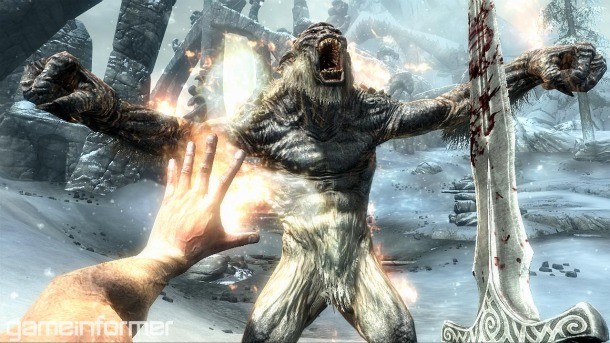Our extra-large special edition is here. Subscribe today and receive the 25% longer issue at no extra cost!
Editorial: Single-Player Games Are Also Social Experiences

It seems like a week doesn't go by without some pundit declaring single-player gaming dead in the face of the current social focus of the Web and electronic entertainment in general (Skyrim launch week excepted). Here's why that line of thought is misguided, mistaken, and misinformed.
The power of social hooks in any endeavor, entertainment or otherwise, is an obvious and undeniable fact of human biology. Even the most introverted of us seeks approval, recognition, and all of the other things that social sharing creates. As our society grows continuously more electronically connected, our natural inclination is to incorporate social interaction into what was traditionally a transaction limited to a man and his machine – but that doesn't mean that every video game has to be multiplayer.
I've been playing a borderline unhealthy amount of Skyrim since it launched. Not once has another player entered my world, and yet it has been a hugely social experience for me. While playing, I'm constantly chatting electronically with my friends about the game: sharing tips, asking questions, bragging about how awesome my sword is (so awesome), and swapping stories about our adventures. Every morning in the office, the GI crew spends a (totally productive, in case Reiner is reading this) fair few minutes doing the same in person. I'm surfing forums on my phone during random downtime, engaging Internet strangers in these same discussions through yet another medium.
By any reasonable definition of the word "social," Skyrim has been a social experience for us despite never connecting to a multiplayer server or hosting a game. And this is in a game that does literally nothing to promote social interactions with its code.
This behavior should come as no surprise to anyone. Any game popular with your circles of friends and acquaintances follows a similar pattern. In the last year, I've done the same with Civilization V, StarCraft II, The Witcher 2, Tropico 4, Minecraft, and many more. And yet, every year it gets more prevalent and easier to do as the Web matures, more people connect with similarly inclined folks through Facebook/Twitter/Xbox Live/etc. In addition, it seems like more games support interpersonal interactions in traditionally single-player genres every year.

The effect of online platforms cannot be understated. Before services like Steam, Impulse, Xbox Live, and PlayStation Network you had to go out of your way to share your gaming experiences with your friends. Even Flash gaming portals have embedded chat, friends lists, achievements, and more. Nowadays, you have to go out of your way to avoid blasting your buddies with updates on what you're playing. In my opinion, that's a fantastic thing as long as I don't have to read a congratulatory tweet every time your avatar takes a virtual dump in The Sims (ahem, GetGlue).
On top of platforms making it easier to connect with people every day, development studios are adding awesome social features into games themselves on an increasingly regular basis. Demon's Souls, Dark Souls, and Disgaea 4, are titles that spring immediately to mind for bringing Internet-connected features into otherwise single-player games, like leaving messages for other players and having your characters appear in other gamers' worlds. EA has done fantastic work with the Autolog in Need for Speed, and is bringing similar concepts to upcoming games like SSX.
I love that developers are thinking of new ways to connect me with my friends and other gamers without taking away the single-player nature of their games' core designs. I just wrote way too many words about how I absolutely adore the things that single-player games can do that are not at all feasible in a multiplayer or MMO setting. Even without explicit systems or built-in sharing, though, games are best enjoyed as social experiences – whether or not you're playing them with anyone else.

Get the Game Informer Print Edition!
Explore your favorite games in premium print format, delivered to your door.
- 10 issues per year
- Only $4.80 per issue
- Full digital magazine archive access
- Since 1991






